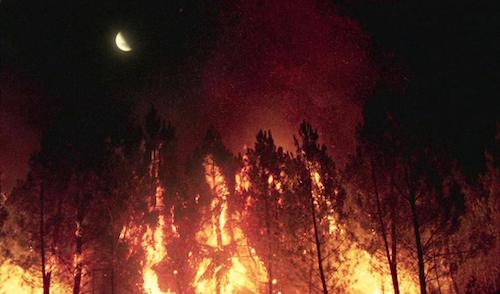Fire Will Come
Editor’s Warning: This is a review of a film shown at the Toronto International Film Festival. There is a chance that this film will not be accessible for a specific period of time, depending on the film’s release date. Be aware that there may be slight spoilers. Proceed at your own discretion.
t's almost impossible to not bring up the recent Amazonian forest fires when reviewing Oliver Laxe's latest art house statement. These fires, deliberately started for capitalistic reasons, mirror the opening passage for Fire Will Come. We see a gorgeous Galician forest with trees overlapping each other to the point of hypnosis; it's like looking at an organic seeing-eye puzzle. Suddenly, these trees get tackled like a rugby player at the knee. They whip over, almost with visible fright. A late night crew is demolishing this forest. This is a film about an arsonist, yet we start with a different kind of natural devastation. Is the arsonist any worse than the company that commissioned this flock of heavy machinery to clear the way? Is a corporate mission any less selfish than meaningless destruction?
Fire Will Come is obsessed with the four natural elements. Water either rips through the grown through pipe or stream, or it rains down on villagers. Earth is clumped into mud, or dried into dust. The air carries around fog, smoke, and debris. The title promises fire, and boy do we get it. Fire is the final straw: pillars of it destroy all three of the other elements. Earth is burned to a crisp. Water cannot calm it down, and a local supply runs out attempting to. The air is turned orange, signifying at least an amalgamation (if not a takeover).
Laxe's latest effort is somewhat unique. It's deeply complex, yet all at face value. One viewing is all you need, but what a viewing that may be. It's an aesthetic experience more than anything. You soak in the freedom of nature, and the claustrophobia causes by human-made corruption. Its super long passages and short running time will most definitely make you recoil and think "Wait... What did I just watch?". Despite this, every symbol is exactly what you think it is. A farmer's cattle mimics the elite stringing workers around. The fire is the inevitable, despite the efforts and intentions of the lower classes. Every relationship here means something different.
Spoiler alert: there is fire.
Laxe compared cinema to a shattered mirror at the TIFF North American premiere of the film. Every piece you pick up offers a new perspective, and everyone will have a different piece and insist theirs depicts a greater whole better. That may very well be true with all of these critical reviews for Fire Will Come. Fire Will Come basically demands this kind of response. You're only given just enough time to work with what you have: a straightforward tale of an arsonist that comes home to try and be a better person, and the construction of civilization around him. The plot continues, but the film thrives on all of the background noise. It's harmonious to say the least.
Fire Will Come won the Un Certain Regarde award at Cannes, and it's easy to see why. The film certainly provides a unique cinematic gaze on current events (even if Laxe approached these topics from a strictly Galician angle). It's absolutely worth a watch, but its ripple effect remains within the confinements of the film itself. You may leave the theatre or your seat putting the film together again, but you may not be bothered to break the film and reassemble it all over again. Fire Will Come is a powerful and current statement, but it's simply a statement, and not the lingering prose it could very well have been.
Andreas Babiolakis has a Masters degree in Film and Photography Preservation and Collections management from Ryerson University, as well as a Bachelors degree in Cinema Studies from York University. His favourite times of year are the Criterion Collection flash sales and the annual Toronto International Film Festival.





